Search the Special Collections and Archives Portal
Search Results
Howard Cannon Papers
Identifier
Abstract
The Howard Cannon Papers (1958-1988) contain the personal, administrative, and legislative papers of Howard W. Cannon, U.S. Senator from Nevada between 1959 to 1983. The collection primarily pertains to Cannon's time in office from the 86th Congress in 1959 to the 97th Congress in 1983. Materials include correspondence, speech transcripts and supporting research material, press releases, reports, memoranda, newspaper and magazine clippings, and Senate voting records. The collection also includes constituent correspondence and casework related to legislative issues such as foreign relations, social security, veterans, tax reform, labor, aviation, nuclear testing and waste, civil rights, and environmental protection.
For a detailed inventory, please contact Special Collections and Archives (special.collections@unlv.edu).
Archival Collection
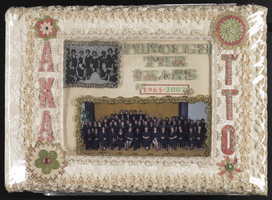
Alpha Kappa Alpha Sorority, Theta Theta Omega Chapter scrapbook: "Through the years"
Date
Archival Collection
Description
From the Alpha Kappa Alpha Sorority, Incorporated, Theta Theta Omega Chapter Records (MS-01014).
Mixed Content

University of Nevada, Las Vegas (UNLV) Fall 2017 commencement program
Date
Archival Collection
Description
Commencement program from University of Nevada, Las Vegas Commencement Programs and Graduation Lists (UA-00115).
Text
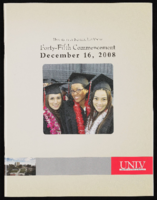
University of Nevada, Las Vegas (UNLV) 45th commencement program
Date
Archival Collection
Description
Commencement program from University of Nevada, Las Vegas Commencement Programs and Graduation Lists (UA-00115).
Text
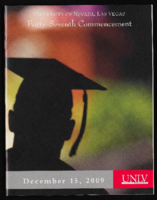
University of Nevada, Las Vegas (UNLV) 47th commencement program
Date
Archival Collection
Description
Commencement program from University of Nevada, Las Vegas Commencement Programs and Graduation Lists (UA-00115).
Text

Transcript of interview with Floyd Jenne by Ping Lee, March 10, 1981
Date
Archival Collection
Description
On March 10, 1981, Floyd Jenne (born June 6th, 1915 in Ogden, Utah) was interviewed by Ping Lee at the University of Nevada, Las Vegas. The interview covers Mr. Lee’s life as a police officer in Boulder City, Nevada. Mr. Lee also recalls going to school in McGill, Nevada and Ely, Nevada and working in Boulder City and Las Vegas, Nevada.
Text

Transcript of interview with Jackie Abell by Robert Stuart, April 03, 1976
Date
Archival Collection
Description
Text
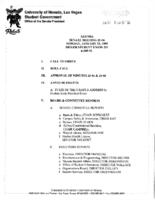
Meeting minutes for Consolidated Student Senate University of Nevada, Las Vegas, January 23, 1995
Date
Archival Collection
Description
Text
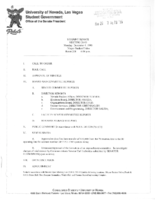
Meeting minutes for Consolidated Student Senate University of Nevada, Las Vegas, December 4, 1995
Date
Archival Collection
Description
Text

Meeting minutes for Consolidated Student Senate University of Nevada, Las Vegas, August 31, 1989
Date
Archival Collection
Description
Text
